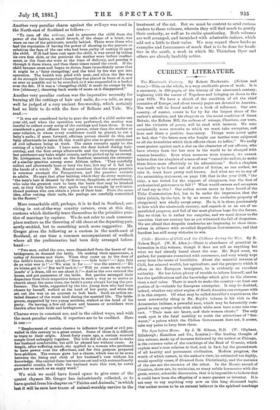CURRENT LITERATURE.
The Nineteenth Century. By Robert Mackenzie. (Nelson and Sons.)—This, on the whole, is a very creditable piece of work. h is a summary, in 460 pages, of the history of the nineteenth century, beginning with the career of Napoleon and bringing us down to the year 1878. We have a sketch of the condition of all the chief countries of Europe, and about twenty pages are devoted to America. The work will be found useful as a book of reference. Our own country, of course, comes in for by far the largest share of the author's attention, and his chapters on the social condition of Great Britain, the Reform Bill, the redress of wrongs, Chartism, our wars, and the victories of peace, will be read with interest. We note occasionally some remarks to which we must take exception, and here and there a positive inaccuracy. Things were never quite so bad, that "the bravo men who fought our battles were subjected to all the brutalities which their officers chose to inflict." We really must protest against such a slur on the character of our officers, who have always been the last men in the world to be charged with wanton brutality. Even when manners were coarsest, we cannot believe that the chaplain of a man-of-war "cursed the sailors, to make them listen more effectively to his admonitions." Such a chaplain was hardly to be found out of stories of fiction, as our author, we take it, must have pretty well known. And what are we to say of the astonishing statement, on page 142, that in the year 1836, "the tithe, a tax levied for the support of clergymen, was the first of ecclesiastical grievances to fall ?" What would owners and occupiers of land say to this ? Our author seems never to have heard of the Tithe Commutation Act, but to be under the impression that the tithe (which, by-the-bye, is by no means the exclusive property of clergymen) was wholly swept away. He is, it is clear, passionately in love with the nineteenth century, and regards it as an era of un- paralleled progress, and full of the most glorious hope for the future. But we think be is rather too sanguine, and we must demur to the assertion that our century has as yet witnessed the fall of despotism. We are afraid that despotic tendencies are beginning to show them- selves in alliance with so-called Republican Governments, and that freedom has still many victories to win.


































 Previous page
Previous page